Everyone is encouraged to come out this weekend to Da-An Forest Park and save beiguan (北管) music. Or is it support beiguan?
The difference between saving and supporting might seem trifling, but the hair-splitting over terminology was at the fore earlier this week when Taipei's academically minded Cultural Affairs Bureau chief Liao Hsien-hao (
"This is not about showcasing an old and disappearing local form of music. The purpose of the festival is to infuse beiguan with new musical elements to make it alive and relevant to a new generation," Liao said.
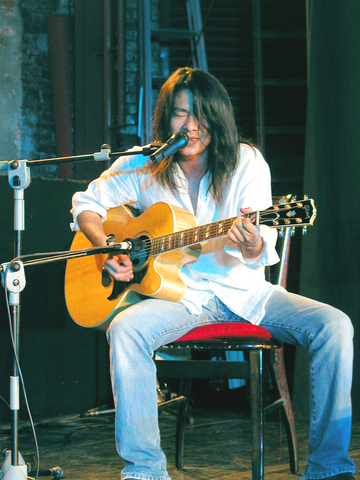
The theme is reminiscent of Taiwan and China's history of attempting to resolve two supposedly irreconcilable sides of a vexing dialectic -- East and West, tradition and modernity being the two most prominent examples -- with results that always defy expectations, often in spectacular ways.
This weekend's festival should be no exception.
Trees Music, which was handed the responsibility of organizing the event, has taken the conceptual framework detailed by Liao to create a series of events and concerts based on beiguan music but not limited by its tradition. It has come up with a supremely eclectic bunch of musicians who would probably otherwise never share a stage.
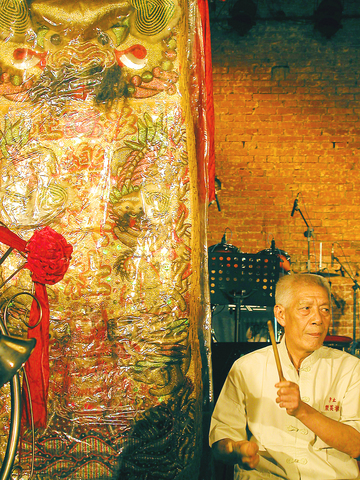
PHOTOS: MAX WOODWORTH, TAIPEI TIMES
Beiguan is the musical accompaniment to northern Chinese theater and in Taiwan was popularized at community temple squares, where not long ago puppet theater and ge-zai-xi (歌仔戲) could be enjoyed practically every weekend. Anyone familiar with Peking opera will immediately recognize the crashing dissonance of beiguan, which is heavy on percussion and simple melodies.
Because beiguan does not have soloists and is intended mostly as background music to a theater performance or singer. Different musical styles can be integrated into it with surprising ease.
The spirit of experimentation in the festival is perhaps best exemplified by the inclusion of DJ Monbaza in the lineup. At Wednesday's presentation, his real-time chopping of beiguan sounds on a computer, mixed with break beats and drum-and-bass, managed to not sound too far removed from the real thing, as performed by the Sijhih City Chinese Music Society.
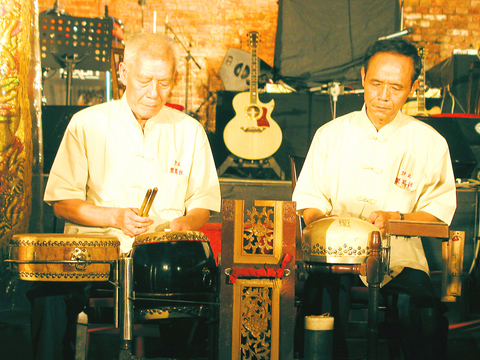
The young three-piece hip-hop group Kou Chou Ching (拷秋勤) are rappers who deliver rhymes over samples from traditional and popular Chinese and Taiwanese music. The result is an unmistakably Taiwanese hybrid without coming off as a musical mutt.
The fusions will get especially creative, however, with the foreign acts that are set to play. Some have no experience with the beiguan tradition and will be learning on the fly to incorporate the local style into their own.
The Tuvan throat-singing rock band
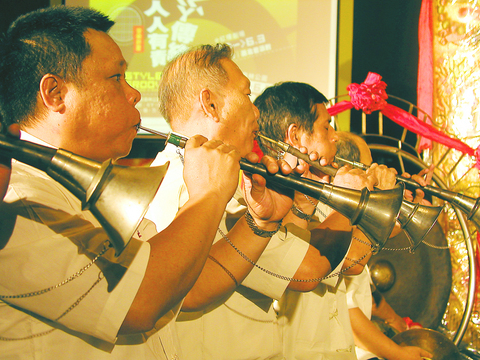
Yat-Kha is back for the second time in Taipei after playing the Migration Music Festival two years ago, but this time has the novel task of applying beiguan to their own music, which has been described as the grumbling anthems of the Siberian steppe.
"When you hear beiguan it sounds like chaos at first," Yat-Kha singer and guitarist Albert Kuvezin said. "But it's quite dramatic and meditative. That's what I like about it."
Beiguan is, in fact, derived from the music of China's northern plains that are near to the Mongolian and Siberian steppes and where strains of tribal music found their way south.
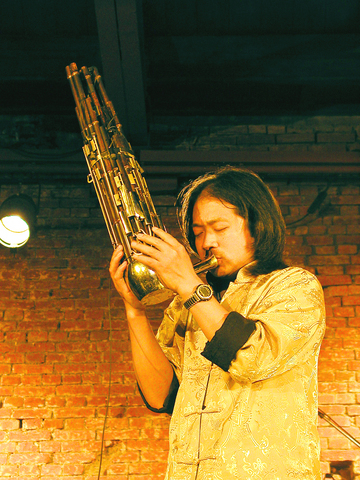
"There are many varieties of rhythms in this beiguan music that are similar to the Buddhist ritual music of where we're from," Kuvezin said, finding a common point of reference that was exploited to surprising effect at the press call earlier in the week, despite a virtual lack of practice beforehand.
Facing the same challenge as Yat-Kha will be Lucas Niggli, a percussionist from Switzerland best known for his contemporary jazz experimentations that often veer into rock and even heavy metal.
Some of the other musicians set to perform include Luantan Ascent (亂彈), the solo project of A-hsiang (阿翔), the singer from the Taiwanese rock band Luantan and traditional Chinese music experimentalist Wu Wei (吳巍), who's now based in Berlin.
Wu is a master of the sheng, a mouth organ with a near 4,000 year history and that can be seen in the Mogao cave paintings at Dunhuang. The instrument is now a common feature of traditional Chinese orchestras and Wu has gained acclaim for his fusing of jazz and other Western musical styles.
Being a beiguan festival, there will also of course be beiguan performances by some of Taiwan's foremost traditional music groups, notably the Sijhih City Chinese Music Society, Luminous World Hand Puppet Theater (明世界掌中劇團), The Gleams (林中光樂團) and opera singer Tang Mei Yun (唐美雲). Each of the bands specializes in different styles of traditional Taiwanese music, which all find some relation to beiguan.
The music begins tonight at Ximending's Red House Theater, with a party featuring DJ Monbaza and some of the festival's musicians, who will perform live to the DJ's music. The more traditional shows will take place tomorrow and Sunday at the outdoor theater of Da-An Forest Park.
What: Old Styles, New Grooves
When: Tonight, tomorrow and Sunday
Where: Red House Theater, 10 Chengdu Rd, Taipei (台北市成都路10號); Da-An Forest Park
Admission to all events is free

The low voter turnout for the referendum on Aug. 23 shows that many Taiwanese are apathetic about nuclear energy, but there are long-term energy stakes involved that the public needs to grasp Taiwan faces an energy trilemma: soaring AI-driven demand, pressure to cut carbon and reliance on fragile fuel imports. But the nuclear referendum on Aug. 23 showed how little this registered with voters, many of whom neither see the long game nor grasp the stakes. Volunteer referendum worker Vivian Chen (陳薇安) put it bluntly: “I’ve seen many people asking what they’re voting for when they arrive to vote. They cast their vote without even doing any research.” Imagine Taiwanese voters invited to a poker table. The bet looked simple — yes or no — yet most never showed. More than two-thirds of those

In the run-up to the referendum on re-opening Pingtung County’s Ma-anshan Nuclear Power Plant last month, the media inundated us with explainers. A favorite factoid of the international media, endlessly recycled, was that Taiwan has no energy reserves for a blockade, thus necessitating re-opening the nuclear plants. As presented by the Chinese-language CommonWealth Magazine, it runs: “According to the US Department of Commerce International Trade Administration, 97.73 percent of Taiwan’s energy is imported, and estimates are that Taiwan has only 11 days of reserves available in the event of a blockade.” This factoid is not an outright lie — that

Former Chinese Nationalist Party (KMT) chairwoman Hung Hsiu-chu’s (洪秀柱) attendance at the Chinese Communist Party’s (CPP) “Chinese People’s War of Resistance Against Japanese Aggression and the World Anti-Fascist War” parade in Beijing is infuriating, embarrassing and insulting to nearly everyone in Taiwan, and Taiwan’s friends and allies. She is also ripping off bandages and pouring salt into old wounds. In the process she managed to tie both the KMT and the Democratic Progressive Party (DPP) into uncomfortable knots. The KMT continues to honor their heroic fighters, who defended China against the invading Japanese Empire, which inflicted unimaginable horrors on the

Sitting on a bus bound for Heping Island (和平島), at the start of my first visit to Keelung in years, I was hell-bent on visiting a place of considerable historical interest, even though I knew that it wasn’t officially open to the public. In 2011, archaeologists working in the densely populated southern half of the island unearthed the foundations of the Convento de Todos los Santos (Convent of All Saints, 諸聖教堂), a Catholic house of worship established during Spain’s 1624-1642 occupation of northern Taiwan. I’d heard about its rediscovery a while ago, but it wasn’t until I read a scholarly